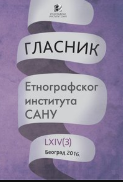Антропогеографски метод и његово место у развоју чешке/чехословачке етнологије
The Anthropogeographic Method and Its Place in the Development of Czech/Czechoslovak Ethnology
Author(s): Miroslav Válka, Jana PospíšilováSubject(s): Customs / Folklore, Human Geography, Cultural Anthropology / Ethnology, Methodology and research technology
Published by: Етнографски институт САНУ
Keywords: ethnology; anthropogeography; ethnographic atlas; Czech Republic; Serbia;
Summary/Abstract: Modern Czech and Slovak ethnology was constituted by Karel Chotek (1881-1967) and Drahomíra Stránská (1899–1964), among others, with a notable contribution by geographer Jiří Král (1893–1975). Methodological basis for their research was the anthropogeographic method of Jovan Cvijić and inspiration by his works. In some countries this research orientation was aimed at the creation of the ethnographic atlas. In former Czechoslovakia preliminary activities were organized by D. Stránská, but political circumstances of that time prevented the finalization of the atlas. Her successors, associates of the Institute for Ethnography and Folklore of the Czechoslovak Academy of Sciences, did not finalize this endeavor either, since the activities on the Ethnographic atlas were removed from the program of basic scientific research after 1970 (during the period of the so-called „normalization“ of political relations). Activities on the Ethnographic atlas were revived after 1989 at the Institute of Ethnology of the Czech Academy of Sciences, with the concept which was, naturally, a matter of discussions and controversies.
Journal: Гласник Етнографског института САНУ
- Issue Year: LXVI/2018
- Issue No: 1
- Page Range: 89-100
- Page Count: 12
- Language: Serbian

